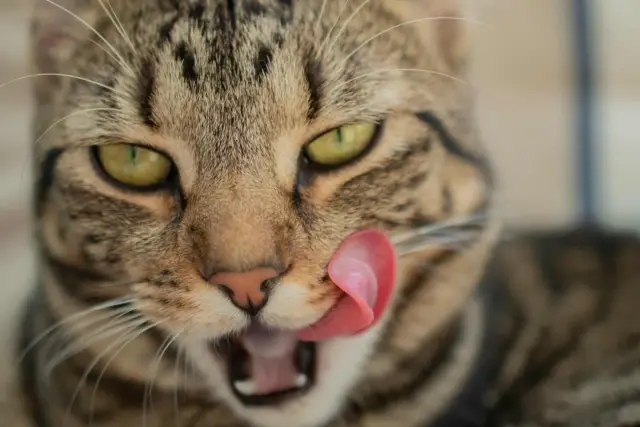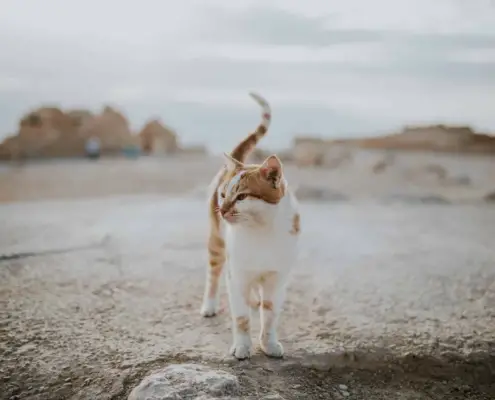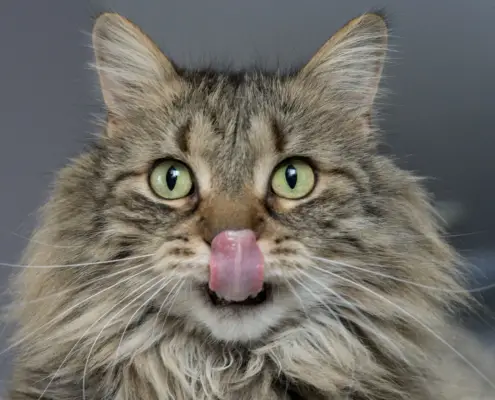
Cats are fascinating creatures with unique behaviors that often leave us puzzled and curious. One behavior that many cat owners have experienced is their feline friends licking them. But why do cats lick humans? In this blog post, we will delve into the behavioral aspect of cats’ licking behavior and explore the reasons behind it.
The Benefits of Cat Licking
Contrary to what some may believe, cats licking humans is not just an unusual behavior, but it also carries numerous benefits for both the cat and the human. For starters, cats licking humans is a sign of affection and bonding. Cats often groom each other as a social activity – when your cat licks you, it is a sign that they consider you to be part of their family.
Secondly, the act of licking also helps cats to mark their territory. Cats have scent glands in their paws and mouths, and when they lick you, they are marking you as their own. This is a sign of trust and companionship.
Lastly, being licked by a cat can have therapeutic benefits for humans. The rhythmic motion of a cat’s tongue can help reduce stress and anxiety levels, providing a calming effect. However, it is also important to remember that excessive licking could indicate underlying health issues in a cat and should be monitored closely.
Health Risks
While the licking behavior of cats may be endearing and a sign of affection, it is crucial to keep in mind the associated health risks. Cats, especially those that are outdoor, can carry bacteria in their mouths which can potentially be harmful to humans. An infection can occur if the cat’s lick comes into contact with an open wound or a person’s eyes, nose, or mouth. Furthermore, if the cat is a carrier of certain parasites such as Toxoplasma gondii, there may be a risk of transmission through licking. Although these risks are relatively low, it is always advisable to maintain good hygiene practices, including washing hands after petting a cat and discouraging them from licking your face or any open wounds.
Why Do Cats Lick Humans?
Cats have a natural instinct to groom themselves and their fellow feline companions. When cats lick humans, it can be seen as an extension of this grooming behavior. However, there are other reasons behind this behavior as well. Some theories suggest that cats may lick humans as a way of showing affection or marking their territory. Others believe that it could be a way for cats to seek attention or communicate their needs.
Debunking Misconceptions about Cat Licking
There are several misconceptions associated with the behavior of cats licking humans. This section aims to debunk some of those myths.
Myth 1: Cats lick humans because they taste good.
While it’s true that cats may be attracted to the salty taste of human skin, this isn’t the primary reason for their licking behavior. It’s more about social bonding and communication.
Myth 2: Licking is a sign of dominance in cats.
In dogs, licking can sometimes be a submissive behavior, but this is not the case with cats. When cats lick humans, it’s more likely to be a sign of affection or a form of social grooming.
Myth 3: If a cat licks you, it means it’s hungry.
While cats may use licking to get attention, it doesn’t necessarily mean they are hungry. It could also be an indication that they are seeking companionship or playtime.
Myth 4: Cats only lick people they like.
Although licking is a sign of affection, it doesn’t always mean that a cat only licks people it is fond of. Cats might also lick to explore their environment or out of stress or anxiety.
Understanding the Meaning of Cat Licking
To truly understand why cats lick humans, it’s essential to interpret this behavior as a form of communication. Cats communicate through a variety of behaviors, and licking is one of them. It can convey different messages and signals depending on the context. For example, if a cat licks you gently and purrs, it could indicate contentment and affection. On the other hand, if a cat licks you excessively or with rough strokes, it might be a sign of stress or anxiety.
Is It Normal for Cats to Lick Their Owners?
Yes, it is entirely normal for cats to lick their owners. This behavior is quite common among cats and can vary from one cat to another. Some cats may exhibit more licking behavior than others, depending on their individual personality and background. Factors such as early socialization, breed tendencies, and the bond between the cat and its owner can influence a cat’s inclination to lick humans.
Responding to Cat Licking
When your cat licks you, it’s important to respond appropriately. While the behavior is generally harmless, there are a few best practices for cat owners to consider. First, ensure that your cat’s licking is not becoming excessive or causing any discomfort. If it becomes bothersome, redirect their attention with interactive toys or provide them with alternative forms of stimulation. It’s also crucial to set boundaries and communicate your preferences to your cat. For example, if you don’t enjoy being licked, gently redirect their behavior or move away from them when they start licking.
Managing Excessive Cat Licking
There can be instances where cat licking may become excessive, which might be indicative of stress, anxiety, or even health issues. Here are some tips for managing excessive cat licking:
- Provide Distractions: To deter your cat from licking excessively, provide them with other activities to engage in. This could include new toys, puzzle feeders, or creating a stimulating environment with cat trees and scratching posts.
- Regular Vet Check-ups: Regular vet visits are essential to ensure that your cat’s excessive licking is not a sign of an underlying health issue. Conditions like allergies, skin problems, or dental diseases could trigger excessive licking.
- Positive Reinforcement: Reward your cat when they engage in behaviors other than excessive licking. This could encourage them to indulge in other activities.
- Consistent Routine: Cats thrive on routine. Make sure to feed them, play with them, and put them to bed at consistent times. This stability can help reduce stress and anxiety, which might be causing the excessive licking.
- Consult a Professional: If you’ve tried everything and your cat’s licking continues to be excessive, it might be time to consult a professional. A professional pet behaviorist can provide personalized strategies and techniques to manage your cat’s excessive licking.
Conclusion
Understanding why cats lick humans can provide valuable insight into their behavior and enhance the bond between cats and their owners. By recognizing that licking is a form of communication, we can better interpret our cats’ needs and respond accordingly. Remember, each cat is unique, and their licking behavior may vary. Pay attention to the context, signals, and your cat’s overall well-being. Building a strong foundation of understanding and communication will help create a harmonious and enriching relationship with your feline companion.
If you enjoyed my article, I would appreciate you sharing it with your network.

Sima Ndlebe
Sima writes for CatBuzz. He is interested in Cats, Health and Fitness, and Entrepreneurship.
Published: 17 November 2023
Related Articles
Disclaimer
The content found on CatBuzz.org is presented on an "as is" basis and is intended for general consumer information and education purposes only. Any utilization of this information is voluntary and solely at the user's own risk.
None of the articles or content should be regarded as, or used in place of, veterinary medical advice, diagnosis, or treatment. The information provided on the website is purely for educational and informational intentions and should not be considered a substitute for professional guidance from a veterinarian or other qualified expert. The articles are designed to inform consumers about veterinary healthcare and medical matters that may impact their cat's daily life. It should be noted that this website and its services do not constitute the practice of any form of veterinary medical advice, diagnosis, or treatment. CatBuzz.org explicitly disclaims any liability for any direct or indirect damages or losses that may arise from the use of or reliance on the information contained within the content.
Consumers must consult a veterinarian, veterinary specialist, or another qualified veterinary healthcare provider when seeking advice regarding their cat's health or medical conditions. It is important not to ignore, avoid, or postpone seeking medical advice from a veterinarian or other qualified veterinary healthcare provider solely based on information obtained from this website. If you believe that your cat may be experiencing a medical issue or condition, it is imperative to promptly contact a qualified veterinary healthcare professional.



